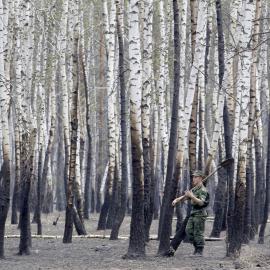Alexander Lukin’s recent article (“What the Kremlin Is Thinking,” July/August 2014) is yet another blunt example of Russia’s misinformation campaign, which has increasingly dominated the public sphere as the crisis in Ukraine continues. The myths publicized by the Kremlin, many of which appear in Lukin’s article, are deeply flawed attempts to justify Russia’s actions in Ukraine.
The first myth has to do with NATO expansion. The Kremlin insists that the West violated its promise to Soviet leader Mikhail Gorbachev not to enlarge NATO. The current policy of the West, according to the Kremlin, is to mitigate Russia’s influence in the region. For the sake of clarity and historical truthfulness, however, it should be understood that the West never made any such promise to Gorbachev. The Kremlin also believes that the West forces European countries to join the European Union and NATO even though they actually desire closer cooperation with Russia. This is also false. The value of Western policy lies in its respect for sovereignty, allowing each country to decide its own future.
The next myth is that the West applies a different standard to itself than it does to Russia. According to Russia, it is the West that violates international laws and treaties, most prominently the Helsinki Final Act of 1975, which recognizes the inviolability of national frontiers.
But it is Russia that has brutally violated international law by exercising military power in its neighborhood. Scholars have tried to dismiss the long-standing conflicts in Nagorno-Karabakh and Transnistria, as well as the Russian occupation of the Georgian territories of Abkhazia and South Ossetia, as inevitable convulsions induced by the collapse of the Soviet Union. But Russia’s recent annexation of Ukraine’s Crimean Peninsula should be a wake-up call. When Kosovo declared independence from Serbia in 2008, Russia said that the West had violated international laws protecting sovereignty. In fact, Kosovo’s declaration of independence came only after exhaustive international discussions. In Crimea, by contrast, there was no attempt to negotiate a solution, and Russia bypassed the entire international community -- including the United Nations -- to occupy part of another country’s territory.
If the Kremlin is to be believed, Russia’s actions are a justified response to NATO’s plans to position armaments and military infrastructure closer to Russia’s borders. In fact, the West has offered Russia an unprecedented level of transparency and openness regarding arms control and missile defense. NATO has indeed supported the upgrading of military infrastructure, including air bases, in countries that have joined the alliance. But the only substantial combat forces in the eastern European countries bordering Russia are their own.
Finally, the Russian government believes it has the right to protect Russians across the world. But Russians worldwide do not need the Kremlin to come to their aid. The cases of Estonia and Latvia have proved that patient and tolerant policies toward national minorities can help prevent conflict. Ethnic minorities in those countries, including ethnic Russians, are given wide access to education and to opportunities to nurture their own cultures and traditions. In fact, the opportunities provided to Russian minorities in the Baltic states are much more comprehensive than those for any minority in the Russian Federation.
Given the misinformation Russia has been promulgating, should the West adopt a more forward-leaning policy toward Russia? The clear answer is no.
The only fruitful long-term strategy for the West would be to encourage Russian compliance with international law. The West should ask Russia for an explicit promise -- in words as well as deeds -- to respect the sovereign rights of other countries, especially those in its neighborhood. The West should also urge Russia to utilize international avenues to resolve conflicts. If Russia is worried about Russian minorities in other states, for example, it can turn for help to the United Nations or the Council of Europe.
The task of the West, in other words, is to stay unified against Russia’s aggression in Ukraine. This includes providing support to Ukraine and other Russian neighbors. The association agreements that the EU recently signed with Georgia, Moldova, and Ukraine are a good starting point. The West should also strengthen NATO’s collective defense capabilities, as agreed at the recent Wales summit.
MARIS RIEKSTINS
Permanent Representative of Latvia to NATO and former Foreign Minister of Latvia
